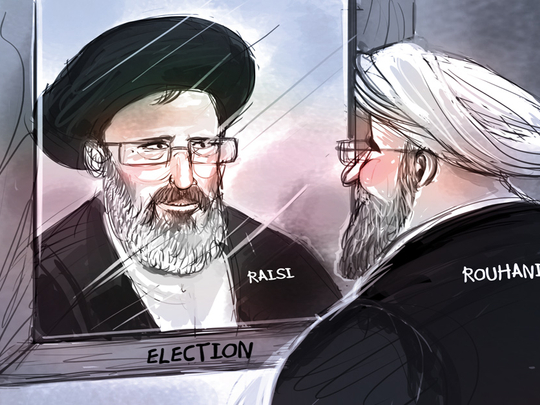
The Iranian presidential elections may see President Hassan Rouhani win a second term or may well bring to power Ebrahim Raisi, a hardline challenger, who is a former prosecutor general in Khorasan-Razavi. Raisi, who is also the custodian of the Astan Quds Razavi — the wealthiest charity in the Muslim world and the organisation in charge of Iran’s holiest shrine, the Imam Reza shrine in Mashhad — drew Rouhani’s ire in the campaign because the institution did not pay taxes. The two men crossed political swords though and irrespective of the victor tomorrow, few expect changes in Tehran’s combative tone, especially in terms of various foreign policy planks.
To be sure, the campaign illustrated serious socio-economic grievances in the country, with Rouhani likely to suffer after last week’s withdrawal from another challenger, Mohammad-Baghar Galibaf, whose perch as Mayor of Tehran was certainly a significant threat, and who publicly backed Raisi. Ironically, this probably allowed hardliners to coalesce around Raisi, a powerful conservative in the fight against Rouhani. Whether Raisi, a contender to succeed the country’s Supreme Leader, Ayatollah Ali Khamanei, can pull a rabbit out of his hat is the key question, though a defeat would scupper his putative chances for the position of supreme leader. In the event, Raisi now has a strong ally in Galibaf, as both men loathe Rouhani and dismiss the reform-minded cleric as the right president for Iran.
Indeed, Galibaf’s support to Raisi should not and cannot be dismissed out of hand because he managed to secure more than six million votes in the 2013 presidential election (against Rouhani’s 18.6 million votes or 50.71 per cent of the total share), which means that Hojjat Al Islam Ebrahim Raisi can count on these supporters en bloc. Moreover, it seems that Rouhani will be forced into a second-round battle this time because few expect him to garner more than 50 per cent of the votes to claim outright victory. And, in a second-round run-off, chances are excellent that the contest will be genuine.
Naturally, while Raisi is not an angel, as he had participated in the orders for the mass execution of leftists and dissidents in 1988 — which means that his human rights record is blemished — it remains to be determined whether voters will accept Rouhani’s criticisms, especially since he alluded during a campaign rally that “The people of Iran will announce in this election that they don’t accept those who only knew executions and prison for 38 years”.
Irrespective of such peculiarities, tomorrow’s elections will be the first since the landmark nuclear agreement signed in 2015 that, to say the least, is also a referendum on Rouhani himself. Most voters will express their views on how well the outgoing head-of-state performed, including on critical economic concerns, aware that Rouhani managed to lower a rampant inflation rate, even if unemployment remains high.
Remarkably, and uncharacteristically, Rouhani engaged in a vigorous campaign, which was undiplomatic in many respects, as the President defended his policies by criticising the Revolutionary Guards. In other words, he sidestepped pragmatism, encouraged fiscal prudence, backed private sector capital, emphasised moderate social norms and defended detente with leading western powers.
Raisi, on the other hand, favours state control of the economy, fiscal populism, religiously-guided social norms and, not surprisingly, closer ties with Russia even if Rouhani maintained the friendliest ties with Moscow too.
In fact, it is difficult to foresee dramatic changes on foreign policy questions as both Rouhani and Raisi perceive the Arab Gulf states in more or less the same way — as neighbourly foes. Both engaged in openly provocative rhetoric against Arabs, stood by extremists in Yemen, Iraq, Syria — and elsewhere throughout the region — and seldom refrained from criticising the new American President, Donald Trump, who may well reverse his predecessor’s Middle East policies.
Of course, whether Iran will now confront reinvigorated American alliances with the Arab Gulf states, Egypt and Israel, remains to be determined, though few should be surprised that Washington is recalibrating its long-term interests. As a counter-measure, Tehran, under a second Rouhani term or under a Raisi presidency will balance such realignments by pursuing even closer cooperation with Russia and Turkey, both of which will create their own sets of challenges even after real power shifts in a post-Khamanei era.
For now, and like most societies, Iranians are focused on economic matters, which regularly posts horrible results. Of course, while Rouhani addressed some of the key aspects of these popular preoccupations, he essentially pursued Iran’s core foreign policy interests, even if his rhetoric abandoned his predecessor’s bombastic record. Rouhani was and is different from former Iranian president Mahmoud Ahmadinejad, but when it comes to fundamental issues, there were and are few differences. Little will change if Raisi were to win as well.
It is for this reason that Raisi is emphasising economic populism and while Khamenei urged candidates to preserve the security of the country, saying that “anyone who deviates from this path should certainly know that they will be given a slap in the face”, Iran will not allow “a sedition”, which is the same term that the regime used against the opposition Green movement after the disputed 2009 election. As the French say, “plus ca change, plus c’est la meme chose” [The more things change, the more they stay the same].
Dr Joseph A. Kechichian is the author of the just-published The Attempt to Uproot Sunni Arab Influence: A Geo-Strategic Analysis of the Western, Israeli and Iranian Quest for Domination (Sussex: 2017).









